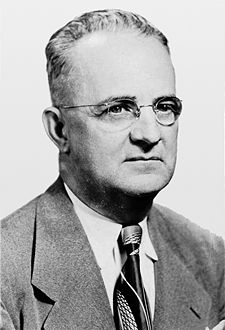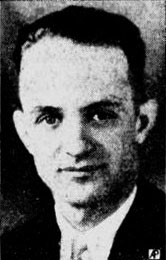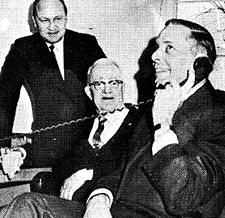Bull Connor
Theophilus Eugene L. "Bull" Connor (born July 11, 1897 in Selma, Dallas County; died March 10, 1973 in Birmingham) was Commissioner of Public Safety for the City of Birmingham from 1937 to 1952 and from 1956 to 1962. He was, throughout his career, one of the most visible and feared enforcers of segregation laws, and became an international villain during the Civil Rights Movement.
During the 1960s, Connor became a symbol of the fight against integration for using fire hoses and police attack dogs against unarmed, non-violent protest marchers. The spectacle of this being broadcast on national television served as one of the catalysts for major social and legal change in the South and helped in large measure to assure the passage of the Civil Rights Act of 1964; thus, Connor's brutal tactics helped to bring about the very change that he was opposing.
Early life and career
Connor was the son of King and Molly Godwin Connor.
Connor and his wife, the former Beara Levens, settled in Birmingham in 1922 and had a daughter. Connor worked as a telegraph operator. As a sideline he forwarded baseball reports from the telegraph office to local pool halls, using a megaphone. His "bull horn" and a similarity to newspaper cartoon figure Dr B. U. L. Conner earned him the nickname he used for the rest of his life. His experience reporting on baseball games led to his hiring as radio announcer for the Birmingham Barons, where he gained much name recognition and popularity.
Connor leveraged that popularity for his first foray into politics. Though he claimed to have entered the race on a lark, he won the Democratic primary for a seat on the Alabama House of Representatives in 1934. As a legislator he supported mainly populist measures. Though he bitterly opposed proposals by Governor Bibb Graves for raising the statewide sales tax and increasing licensing fees, he did vote to extend the state's poll tax. He generally supported a pro-union agenda and voted against an anti-sedition bill meant to stifle union activity. When a controversial bill was entered by William McDermott of Mobile to replace the goldenrod as state flower with the azalea, he suggested a compromise, offering an amendment to name the azalea as Alabama's "assistant state flower".
Connor did not stand for a second term in 1936, instead running for an associate seat on the Birmingham City Commission in the 1937 Birmingham municipal election.
Police Commissioner
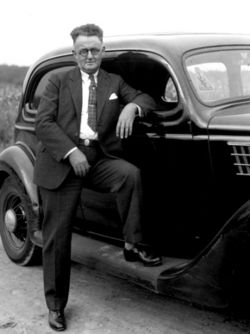
In all, Connor served as Commissioner for 23 years between 1937 to 1963 (interrupted by scandal in the early 1950s). The first years of his office produced little controversy. That changed in May, 1948, when Connor's officers arrested a U.S. Senator from Idaho, Glen H. Taylor, who was running for Vice President of the United States on the Progressive Party ticket with Henry Wallace. Taylor, who had attempted to speak to the Southern Negro Youth Congress, was arrested for violating Birmingham's segregation laws. Connor led the Alabama delegation in a walkout of the national Democratic convention when the party included a civil rights plank in its platform.
Connor's concerted effort to enforce the law was sparked by the group's reported Communist philosophy, with Connor noting at the time, "There's not enough room in town for Bull and the Commies." On July 18, 1950 the Commission passed an ordinance proposed by Connor that made "communication or voluntarily association" with the Communist Party a misdemeanor punishable by a fine of $100 and 180 days in jail. Connor gave any communists 48 hours to vacate the city.
Also in 1950, Connor campaigned for Governor of Alabama on a platform of "protecting employment practices, law enforcement, segregation and other problems that have been historically classified as states' rights by the Democratic party." That bid, along with another attempt in 1954, would fail.
In late 1951, Connor became embroiled in a feud with city detective Henry Darnell after Connor's wife claimed to have witnessed an incident of police brutality. Connor investigated and charged Darnell with conduct unbecoming an officer.
On December 26 of that year Connor himself was arrested after having being found in a hotel room with his 34-year-old secretary, Christina Brown, following a Christmas party five days earlier. Connor claimed he was set up and blamed internal dissension in the Birmingham Police Department. He was convicted in the city's police court, fined $100, and given a 180-day sentence. Attorney T. C. McVea, representing an anonymous group of dissatisfied civil service workers, circulated a recall petition shortly after his conviction. Impeachment proceedings followed, but those efforts hit a dead end when the Alabama Court of Appeals threw out Connor's conviction on June 11, 1952. Connor did not run for the city commissioner position in the subsequent election.
Return to the Commission
After returning to office in 1956, Connor quickly resumed his heavy-handed approach to dealing with perceived threats. One prominent instance came when a meeting at Rev. Fred Shuttlesworth's house with three Montgomery, Alabama ministers was raided, with Connor fearing that a spread of the bus boycott that had succeeded in Montgomery was imminent. The ministers were arrested for vagrancy, which did not allow a prisoner bail, nor any visitors during the first three days of their incarceration. A federal investigation followed, but Connor refused to cooperate.
Shuttlesworth, however, had been consistently in danger in the previous two years, having seen his church bombed twice. He, his wife and a white minister were also attacked by a mob after attempting to use white restrooms at the local bus station.
In 1960, Connor was elected Democratic National Committeeman for Alabama, soon after filing a lawsuit against the New York Times for $1.5 million, for what he said was insinuating that he had promoted racial hatred. Later dropping the amount to $400,000, the case would drag on for six years until Connor lost a $40,000 judgement on appeal.
In November 1962, Birmingham voters changed the city's form of government, with the mayor now working with nine councilmen instead of three city commissioners. The move had been in response to the extremely negative perception of the city (which had been derisively nicknamed "Bombingham") among outsiders. The most prominent example of this continuing embarrassment came in 1961 when the president of the city's Chamber of Commerce was visiting Japan, only to see a newspaper photo of a Birmingham-bound bus engulfed in flames near Anniston.
Connor attempted to run for mayor, but lost on April 2, 1963. He and his fellow commissioners then filed suit to block the change in power, but on May 23, the Alabama Supreme Court voted against the lawsuit, ending a 23-year tenure in the post for Connor.
Project Confrontation
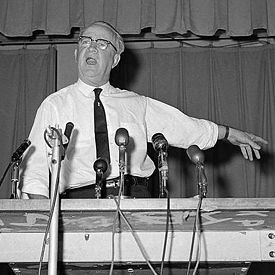
The day after the April election, civil rights leaders, led by Dr. Martin Luther King, Jr., began "Project Confrontation" in Birmingham against the police tactics used by Connor and his subordinates (and, by extension, other Southern police officials.) King's arrest during this period would provide him the opportunity to write his legendary "Letter from Birmingham Jail" The goal of this movement was to cause mass arrests and subsequent inability of the judicial and penal systems to deal with this volume of activity. One key strategy was the use of children to further the cause, a tactic that was criticized on both sides of the issue. The short-term effect only increased the level of violence used by Connor's officers, but in the long term the project proved largely successful, as noted above.
On June 3, 1964, Connor resumed his place in government when he was elected to the post of Alabama Public Service Commission director.
Stroke and later life
Connor suffered a stroke on December 7, 1966 that left him confined to a wheel chair for the rest of his life. He won another term in the 1968 election, but was defeated in 1972, putting an end to his long political career.
He was present in Haleyville's police station on February 16, 1968, when 911 was first used as an emergency telephone number in the United States.
Another stroke on February 26, 1973, weeks before his death, left him unconscious. Survivors included his widow and daughter, and his brother, King Edward Connor.
References
- "Battle Lines Drawn for Flower Contest" (March 10, 1936) Tuscaloosa News
- "Birmingham officials pass anti-red action." (July 19, 1950) Tuscaloosa News
- "Petition for recall of 'Bull' Connor is signed by hundreds." (January 16, 1952) Florence Times-Daily
- Nunnelly, William A. (1991) Bull Connor. Tuscaloosa: University of Alabama Press ISBN 0817304959
- "Bull Connor." Wikipedia, The Free Encyclopedia. 28 Mar 2006, 05:28 UTC. 28 Mar 2006, 20:16 [1].
- "Eugene 'Bull' Connor Dies at 75", (March 11, 1973) Associated Press
External links
- Segregation at All Costs: Bull Connor and the Civil Rights Movement. National History Day documentary
